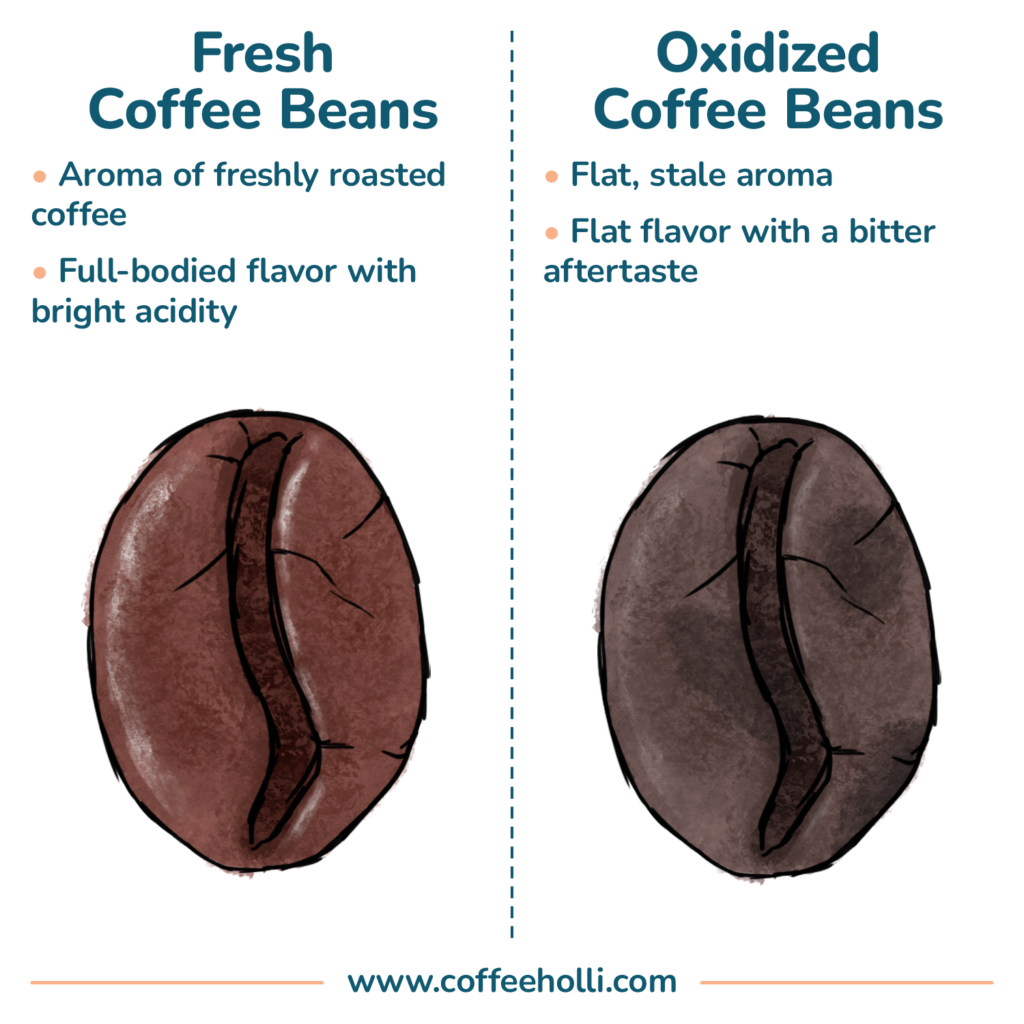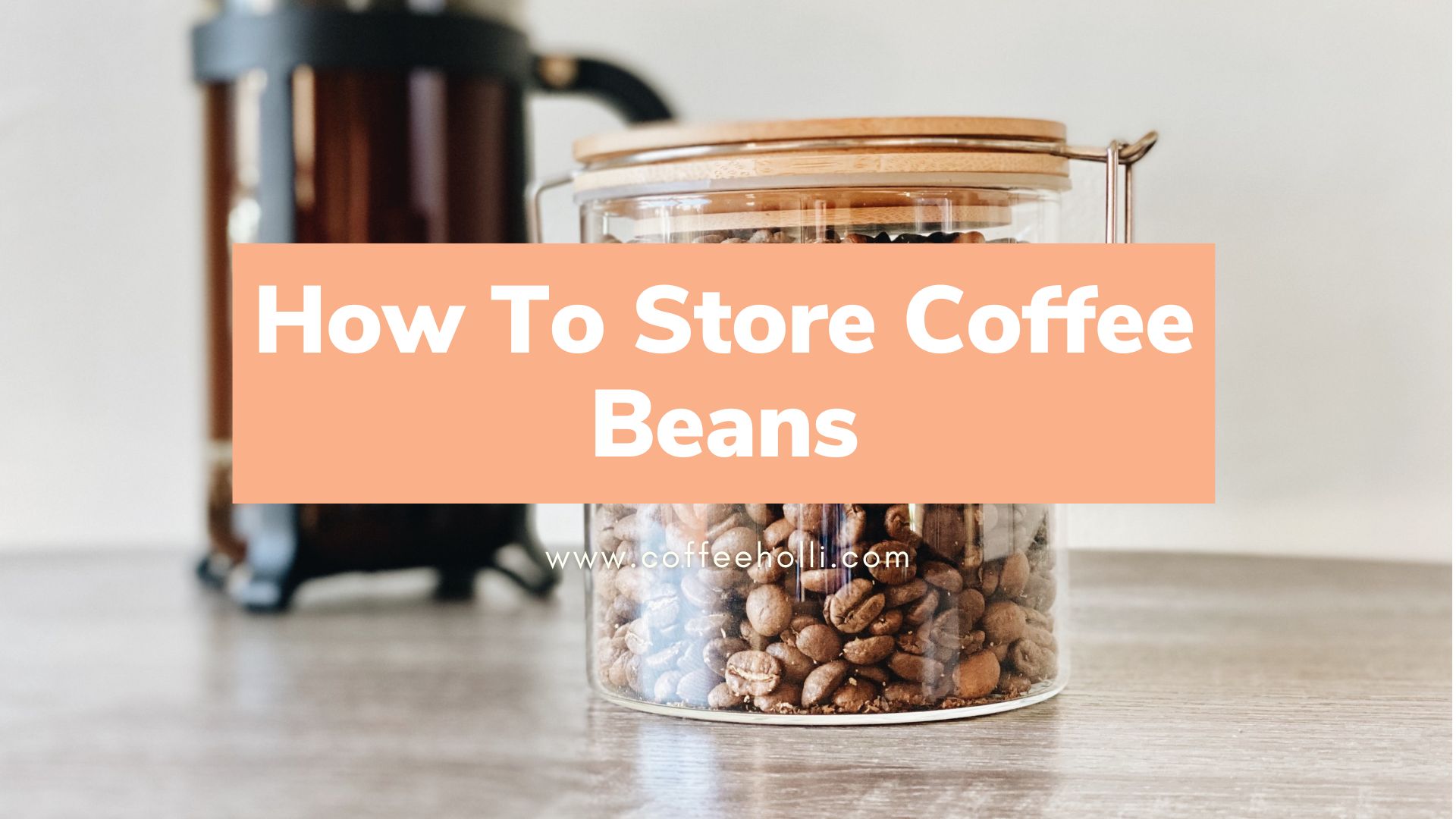As you know:
The aroma, acidity, and body of a cup of coffee depend on a heap of factors. There is a lot at stake during farming, processing and roasting that impacts the quality of coffee beans.
However:
Most of these determinants are out of your control.
For you, the only areas you have a role to play are during storage and preparation. You can buy the most expensive and rare coffee beans, but if you mess up during these stages, you will end up with a disappointing cup of coffee.
Now:
This post covers everything you need to know on how to store coffee beans, including whether to use the original packaging or a storage canister. And whether to store it in a pantry, freezer, or fridge.
Before getting into how to store coffee beans, let’s detail coffee beans’ greatest enemies.
Table of Contents
Factors That Impact Coffee Beans’ Freshness
Now:
The choice of how and where to store coffee beans is dictated by the nature of coffee beans. There are four major elements that impact the quality of coffee beans.
1. Oxygen

When exposed to oxygen, coffee beans start losing their aromas and flavours to the air through the process of oxidation. This includes the loss of the sweet-smelling aldehydes, buttery aromas, and earthy pyrazines.
Apart from the aroma degradation, exposure to oxygen also results in the oxidation of oils, making the beans rancid.
2. Moisture
After roasting, coffee beans tend to absorb moisture from the surrounding. Moisture also encourages the development of mould and mildew.
3. Time
The moment coffee beans are roasted, it’s a race against time and oxygen. Immediately after roasting, the quality of the beans starts going down. That’s why it’s recommended to get freshly roasted coffee beans.
Note:
Coffee beans are best for espresso between 5-11 days after roasting. 4-7 days for drip/pour-over, while the sweet spot for cold brew is between 10 and 14 days.
That’s why you should only buy coffee beans that have the roast date indicated.
4. Temperature
Temperature plays a huge role in the freshness and quality of coffee beans. The ideal temperature for coffee beans is below room temperature. High temperatures and direct sunlight facilitate oxidation leading to loss of aroma.
How to Store Coffee Beans for Peak Freshness
1. Store Whole Beans
Now:
You can only make yourself a delicious cup of coffee if you grind the beans just before brewing.
That’s why:
You should don’t grind coffee beans in advance. Store them as whole beans and grind only what you will be using.
The issue is:
Pre-ground coffee loses aroma and flavours faster than whole beans. Ground coffee loses flavours ten times faster than coffee beans and gets stale faster.
2. How To Store Coffee Beans
Now:
There are two ways of storing coffee beans.
You can store them in the original packaging or use a coffee storage canister. Most coffee beans packaging bags have a one-way valve that only allows the exit of C02 without allowing oxygen to enter.
If the packaging doesn’t feature the degassing valve, put the coffee beans in an airtight storage canister. The best storage container for coffee beans should be an opaque glass or ceramic container.
Note:
You can use a clear container but keep it in a dark place.
3. Where To Store Coffee Beans
Now:
The best place to store coffee beans is in a cabinet or pantry that is cool, dark, and dry.
If the container is opaque, you can place it on a counter, provided there is no direct sunlight.
When a coffee storage canister is placed in direct sunlight, you are creating a greenhouse effect. The light entering the jar will heat up the coffee beans, accelerating oxidation.
I know it’s tempting to use coffee beans as a conversation starter, but if you care about the taste of your coffee, avoid it. For visual effects, let it be a small amount that you are using that day.
Keep your coffee beans away from warm spots and away from areas with strong odours.
4. Don’t Store Coffee Beans In Your Grinder
While it’s very convenient storing coffee beans in the grinder, that’s not a great idea, even if you will be using them in the course of the day.
Why?
Coffee grinders are not airtight, so the grinder presents the best conditions for oxidation.
5. Don’t Store Coffee Beans In The Fridge
While the fridge is dark and cold, it will mess with your coffee beans. Because coffee acts as a deodoriser, it absorbs the smells in the fridge, messing up with its natural taste. A cup of coffee made from refrigerated coffee beans will be flat.
6. Freeze Only If Necessary
While it’s okay to freeze coffee beans, it degrades the quality since the low temperature changes the cell structure.
So:
If you must freeze, package the beans in small quantities and don’t refreeze after thawing. When you remove the beans from the freezer, place them on a shelf to thaw and use them in the next few days.
Caution:
Don’t put them in a microwave or hot water.
Conclusion
How you store your coffee beans before grinding impacts the quality of your cup of coffee. Coffee beans’ enemies are heat, moisture, and oxygen. Store coffee beans in either the original packaging or an opaque canister, and place it in a cool and dry place.
Frequently Asked Questions on How to Store Coffee
If you want to make the best cup of coffee, use coffee between 3 and 14 days from the roasting date. That’s why it’s recommended to buy coffee beans in small batches. While coffee beans don’t go bad, their quality won’t be near that of freshly roasted beans.
Whether the coffee beans bag is opened or not, use coffee beans within two weeks from the roasting date. Of course, properly stored coffee beans are still usable even after one year, but their quality will have deteriorated.
Coffee beans don’t go bad. That’s why you won’t see an expiry date on a coffee beans bag. However, coffee beans lose their freshness within the first month.
Just like in any other place in the world, store coffee beans in an opaque, airtight canister. Place the canister in a dry and cool place cabinet or pantry, away from direct sunlight and heat.
Yes, 2-year old coffee beans are still safe to grind and make a cup of coffee. They won’t make you sick. However, the cup of coffee you will make will have a rancid aroma.
Storing coffee beans in a mason jar is not a good idea. First, most mason jars are not airtight and will allow oxygen to enter, facilitating oxidation. Secondly, mason jars are clear and will allow sunlight to penetrate.


